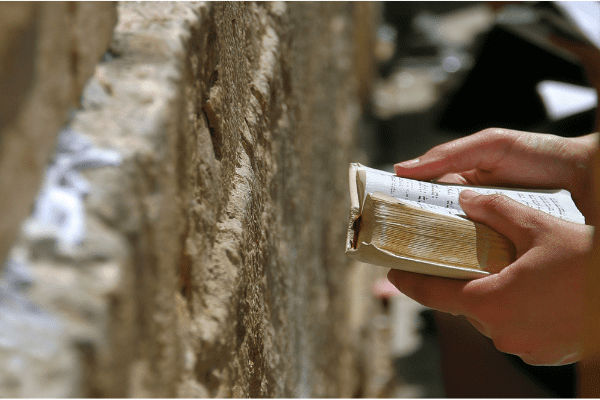
TORAH
NEVI'IM
KETUVIM
Chapter 17
Translation and Transliteration of
Listen to this chapter in Hebrew:
- Commentary
- Buy E-book
- Buy the Israel Bible
1You shall not sacrifice to Hashem your God an ox or a sheep that has any defect of a serious kind, for that is abhorrent to Hashem your God.
אלֹא־תִזְבַּח לַיהֹוָה אֱלֹהֶיךָ שׁוֹר וָשֶׂה אֲשֶׁר יִהְיֶה בוֹ מוּם כֹּל דָּבָר רָע כִּי תוֹעֲבַת יְהֹוָה אֱלֹהֶיךָ הוּא׃
2If there is found among you, in one of the settlements that Hashem your God is giving you, a man or woman who has affronted Hashem your God and transgressed His covenant
בכִּי־יִמָּצֵא בְקִרְבְּךָ בְּאַחַד שְׁעָרֶיךָ אֲשֶׁר־יְהֹוָה אֱלֹהֶיךָ נֹתֵן לָךְ אִישׁ אוֹ־אִשָּׁה אֲשֶׁר יַעֲשֶׂה אֶת־הָרַע בְּעֵינֵי יְהֹוָה־אֱלֹהֶיךָ לַעֲבֹר בְּרִיתוֹ׃
3turning to the worship of other gods and bowing down to them, to the sun or the moon or any of the heavenly host, something I never commanded
גוַיֵּלֶךְ וַיַּעֲבֹד אֱלֹהִים אֲחֵרִים וַיִּשְׁתַּחוּ לָהֶם וְלַשֶּׁמֶשׁ אוֹ לַיָּרֵחַ אוֹ לְכָל־צְבָא הַשָּׁמַיִם אֲשֶׁר לֹא־צִוִּיתִי׃
4and you have been informed or have learned of it, then you shall make a thorough inquiry. If it is true, the fact is established, that abhorrent thing was perpetrated in Yisrael,
דוְהֻגַּד־לְךָ וְשָׁמָעְתָּ וְדָרַשְׁתָּ הֵיטֵב וְהִנֵּה אֱמֶת נָכוֹן הַדָּבָר נֶעֶשְׂתָה הַתּוֹעֵבָה הַזֹּאת בְּיִשְׂרָאֵל׃
5you shall take the man or the woman who did that wicked thing out to the public place, and you shall stone them, man or woman, to death.
הוְהוֹצֵאתָ אֶת־הָאִישׁ הַהוּא אוֹ אֶת־הָאִשָּׁה הַהִוא אֲשֶׁר עָשׂוּ אֶת־הַדָּבָר הָרָע הַזֶּה אֶל־שְׁעָרֶיךָ אֶת־הָאִישׁ אוֹ אֶת־הָאִשָּׁה וּסְקַלְתָּם בָּאֲבָנִים וָמֵתוּ׃
6A person shall be put to death only on the testimony of two or more witnesses; he must not be put to death on the testimony of a single witness.
ועַל־פִּי שְׁנַיִם עֵדִים אוֹ שְׁלֹשָׁה עֵדִים יוּמַת הַמֵּת לֹא יוּמַת עַל־פִּי עֵד אֶחָד׃
7Let the hands of the witnesses be the first against him to put him to death, and the hands of the rest of the people thereafter. Thus you will sweep out evil from your midst.
זיַד הָעֵדִים תִּהְיֶה־בּוֹ בָרִאשֹׁנָה לַהֲמִיתוֹ וְיַד כָּל־הָעָם בָּאַחֲרֹנָה וּבִעַרְתָּ הָרָע מִקִּרְבֶּךָ׃
8If a case is too baffling for you to decide, be it a controversy over homicide, civil law, or assault—matters of dispute in your courts—you shall promptly repair to the place that Hashem your God will have chosen,
חכִּי יִפָּלֵא מִמְּךָ דָבָר לַמִּשְׁפָּט בֵּין־דָּם לְדָם בֵּין־דִּין לְדִין וּבֵין נֶגַע לָנֶגַע דִּבְרֵי רִיבֹת בִּשְׁעָרֶיךָ וְקַמְתָּ וְעָלִיתָ אֶל־הַמָּקוֹם אֲשֶׁר יִבְחַר יְהֹוָה אֱלֹהֶיךָ בּוֹ׃
9and appear before the levitical Kohanim, or the magistrate in charge at the time, and present your problem. When they have announced to you the verdict in the case,
טוּבָאתָ אֶל־הַכֹּהֲנִים הַלְוִיִּם וְאֶל־הַשֹּׁפֵט אֲשֶׁר יִהְיֶה בַּיָּמִים הָהֵם וְדָרַשְׁתָּ וְהִגִּידוּ לְךָ אֵת דְּבַר הַמִּשְׁפָּט׃
10you shall carry out the verdict that is announced to you from that place that Hashem chose, observing scrupulously all their instructions to you.
יוְעָשִׂיתָ עַל־פִּי הַדָּבָר אֲשֶׁר יַגִּידוּ לְךָ מִן־הַמָּקוֹם הַהוּא אֲשֶׁר יִבְחַר יְהֹוָה וְשָׁמַרְתָּ לַעֲשׂוֹת כְּכֹל אֲשֶׁר יוֹרוּךָ׃
11You shall act in accordance with the instructions given you and the ruling handed down to you; you must not deviate from the verdict that they announce to you either to the right or to the left.
יאעַל־פִּי הַתּוֹרָה אֲשֶׁר יוֹרוּךָ וְעַל־הַמִּשְׁפָּט אֲשֶׁר־יֹאמְרוּ לְךָ תַּעֲשֶׂה לֹא תָסוּר מִן־הַדָּבָר אֲשֶׁר־יַגִּידוּ לְךָ יָמִין וּשְׂמֹאל׃
12Should a man act presumptuously and disregard the Kohen charged with serving there Hashem your God, or the magistrate, that man shall die. Thus you will sweep out evil from Yisrael:
יבוְהָאִישׁ אֲשֶׁר־יַעֲשֶׂה בְזָדוֹן לְבִלְתִּי שְׁמֹעַ אֶל־הַכֹּהֵן הָעֹמֵד לְשָׁרֶת שָׁם אֶת־יְהֹוָה אֱלֹהֶיךָ אוֹ אֶל־הַשֹּׁפֵט וּמֵת הָאִישׁ הַהוּא וּבִעַרְתָּ הָרָע מִיִּשְׂרָאֵל׃
13all the people will hear and be afraid and will not act presumptuously again.
יגוְכָל־הָעָם יִשְׁמְעוּ וְיִרָאוּ וְלֹא יְזִידוּן עוֹד׃
14If, after you have entered the land that Hashem your God has assigned to you, and taken possession of it and settled in it, you decide, “I will set a king over me, as do all the nations about me,”
ידכִּי־תָבֹא אֶל־הָאָרֶץ אֲשֶׁר יְהֹוָה אֱלֹהֶיךָ נֹתֵן לָךְ וִירִשְׁתָּהּ וְיָשַׁבְתָּה בָּהּ וְאָמַרְתָּ אָשִׂימָה עָלַי מֶלֶךְ כְּכָל־הַגּוֹיִם אֲשֶׁר סְבִיבֹתָי׃
15you shall be free to set a king over yourself, one chosen by Hashem your God. Be sure to set as king over yourself one of your own people; you must not set a foreigner over you, one who is not your kinsman.
טושׂוֹם תָּשִׂים עָלֶיךָ מֶלֶךְ אֲשֶׁר יִבְחַר יְהֹוָה אֱלֹהֶיךָ בּוֹ מִקֶּרֶב אַחֶיךָ תָּשִׂים עָלֶיךָ מֶלֶךְ לֹא תוּכַל לָתֵת עָלֶיךָ אִישׁ נָכְרִי אֲשֶׁר לֹא־אָחִיךָ הוּא׃
16Moreover, he shall not keep many horses or send people back to Egypt to add to his horses, since Hashem has warned you, “You must not go back that way again.”
טזרַק לֹא־יַרְבֶּה־לּוֹ סוּסִים וְלֹא־יָשִׁיב אֶת־הָעָם מִצְרַיְמָה לְמַעַן הַרְבּוֹת סוּס וַיהֹוָה אָמַר לָכֶם לֹא תֹסִפוּן לָשׁוּב בַּדֶּרֶךְ הַזֶּה עוֹד׃
17And he shall not have many wives, lest his heart go astray; nor shall he amass silver and gold to excess.
יזוְלֹא יַרְבֶּה־לּוֹ נָשִׁים וְלֹא יָסוּר לְבָבוֹ וְכֶסֶף וְזָהָב לֹא יַרְבֶּה־לּוֹ מְאֹד׃
18When he is seated on his royal throne, he shall have a copy of this Teaching written for him on a scroll by the levitical Kohanim.
יחוְהָיָה כְשִׁבְתּוֹ עַל כִּסֵּא מַמְלַכְתּוֹ וְכָתַב לוֹ אֶת־מִשְׁנֵה הַתּוֹרָה הַזֹּאת עַל־סֵפֶר מִלִּפְנֵי הַכֹּהֲנִים הַלְוִיִּם׃
19Let it remain with him and let him read in it all his life, so that he may learn to revere Hashem his God, to observe faithfully every word of this Teaching as well as these laws.
יטוְהָיְתָה עִמּוֹ וְקָרָא בוֹ כָּל־יְמֵי חַיָּיו לְמַעַן יִלְמַד לְיִרְאָה אֶת־יְהֹוָה אֱלֹהָיו לִשְׁמֹר אֶת־כָּל־דִּבְרֵי הַתּוֹרָה הַזֹּאת וְאֶת־הַחֻקִּים הָאֵלֶּה לַעֲשֹׂתָם׃
20Thus he will not act haughtily toward his fellows or deviate from the Instruction to the right or to the left, to the end that he and his descendants may reign long in the midst of Yisrael.
l'-vil-TEE rum l'-va-VO may-e-KHAV u-l'-vil-TEE SUR min ha-mitz-VAH ya-MIN us-MOL l'-MA-an ya-a-REEKH ya-MEEM al mam-lakh-TO HU u-va-NAV b'-KE-rev yis-ra-AYL
כלְבִלְתִּי רוּם־לְבָבוֹ מֵאֶחָיו וּלְבִלְתִּי סוּר מִן־הַמִּצְוָה יָמִין וּשְׂמֹאול לְמַעַן יַאֲרִיךְ יָמִים עַל־מַמְלַכְתּוֹ הוּא וּבָנָיו בְּקֶרֶב יִשְׂרָאֵל׃
17:20 Thus he will not act haughtily
Verses 14-20 discuss the command for the People of Israel to appoint a king, and the subsequent restrictions the Torah places on the kings of Israel. Appointing a king is one of the three commandments that the Jews were instructed to perform after settling the land. Without leadership, chaos ensues, as the verse implies “In those days there was no king in Yisrael; everyone did as he pleased” (Judges 21:25). However, there is a risk that the king will forget the source of his strength and attribute his successes to his own wisdom and power. Therefore, the Bible places three special restrictions upon the kings, and also requires that they carry a copy of the Torah with them at all times. The laws of the kings remind us that we all must recognize the true source of blessing and success in our lives.








